Bullying
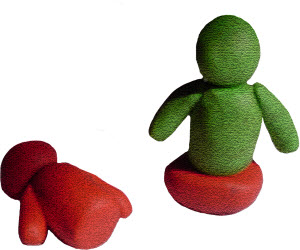
Family talk can create synergy and help everyone become the best they can be.
Family councils are a great way to bring children and parents together in a positive environment where they can discuss and solve problems. The constructive energy generated by these family discussions may not revolutionize the world, but the generation that comes from them just may.
Older Brother raised his fist above Little Sister's head. She cowered. He laughed. No one saw it. Little Sister slipped away to her room and shut her door to play with her dolls.
She acted out her hurt. Monster doll hit Baby Doll and sent Baby Doll to her room.
For Adults:
Schools and society have established a no tolerance stance on bullying. But all too often dynamics like the situation above are acted and reenacted in homes, on the play ground, and in schools at times when no adults are present.
Be aware of what's going on around you. Watch your children and be conscious of their relationships.
Help kids:
- Discuss bullying problems.
- Stop bullying if they see it.
- Talk to an adult about how to solve a bullying situation.
- Hang out with friends that are nice to each other.

Chat with your kids about the reasons young people bully and help them understand the dynamics. Sometimes kids bully because they are bullied at home by a parent or sibling. Kids bully because their friends do. They bully because other kids bullied them. They bully because their parents don't pay attention to them. Kids bully because they have been hurt.
Bullying is about the child doing the bullying; it's NOT about the child being bullied.
- Model kindness for your children.
- Help them learn to be compassionate.
- Involve them in service projects.
- Talk about how others feel so they will develop empathy.
- Teach them assertiveness skills like standing up straight and looking others in the eye.
- Give them opportunity to develop their talents and become the best they can be.
Let's make the world become a kinder place by continuing to add light and love to our sphere of influence. Let's help eradicate bullying by doing our part.
I have decided to stick with love. Hate is too great a burden to bear.
—Martin Luther King, Jr.
For Kids:
Bullying means: calling someone names, saying bad things to them, physically hurting them, or taking their things. If you belong to a group of friends that do these kinds of things, find other kids to hang out with.
We show other kids how to treat us by:
-
The way we hold our heads.
Keep your head up so you know what's happening in life.
-
The expression on our faces.
Add a smile to your face so people will know you're friendly.
-
How we hold our shoulders.
Square your shoulders and stand up straight.
-
How we speak.
Look others in the eye when you talk to them so they'll know you are interested in what they have to say.
-
The way we act.
Be friendly with those around you. Find out about them and tell them about you.
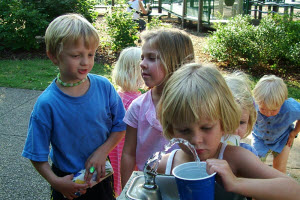
If you or someone else is being bullied, tell a grownup who the bully is, where the bully does his bullying, and exactly what the bully does.
Things you can do if you have been bullied:
- Walk with a friend.
-
Stay away from places you have been bullied.
- Walk a different way to school.
- Leave a little earlier.
- Sit near the bus driver.
- Join friends in the lunch room.
- Hang with friends in the library room and homework club.
-
Leave your expensive important things home.
- Don't bring money to school.
- Put your name on your belongings.
- Don't bully yourself. Be nice to you.
Everyone has the bully… who tried to bring them down.
—Demi Lovato
Name Calling

Family talk can create synergy and help everyone become the best they can be.
Family councils are a great way to bring children and parents together in a positive environment where they can discuss and solve problems. The constructive energy generated by these family discussions may not revolutionize the world, but the generation that comes from them just may.
Children learn communication patterns from many different sources: home, extended family, school, community groups, and church organizations. Even if we, as parents, keep our family interaction positive, our children are exposed to teasing and name-calling.
It's important to let children know your interaction goals. If you want a loving, caring family, teach them that positive, uplifting communication leads to positive, uplifting relationships.
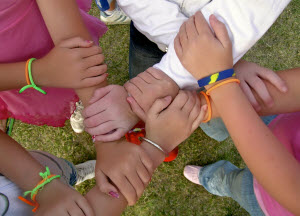
"You're fat," yelled Samantha, age 10, at her sister Bea, age 8.
"I am not!" Bea yelled back. "Your nose is crooked."
"What?" Sam ran to the bathroom to look in the mirror. "It is not." She stuck her tongue out at Bea.
Bea fell into Mother's arms. "Am I fat?"
"You're just the way you're supposed to be," said Mother. "I think you're beautiful."
"Mothers have to say that," said Bea.
Dad looked up from his computer. "I think you're beautiful. Are Dads supposed to say it too?"
Bea giggled.
For Adults:
Talk with your children about hurting each other's feelings.
- Ask Sam how she thinks Bea feels when she calls her fat.
- Kids aren't born knowing how to communicate. We have to teach them.
- Hold a family meeting and talk about how to treat each other.
- Ask the children how to solve the problem.
- Practice giving compliments.
- Create a sticker chart. Every time someone gives a compliment, add a sticker. When the page is full, have a pizza party.

It takes at least six weeks to change a habit so be patient. Give everyone time to change.
If parents are positive with each other in their interaction, children will follow the same communication pattern. If parents are kind and empathetic, children will be also.
Live what you want to teach.
For Kids:
- Think about how you feel when someone calls you names.
- Remember those feelings before you say something mean.
- Think of a compliment to give someone. They'll feel good and you will also.
- If you say something nice, you'll feel happy inside.
- If you say something mean, you'll feel bad inside.
- Create positive family feelings.
- Talk with your family about only saying nice things to each other. It's a great goal.
I love giving positive feedback to others because I feel good when I do it. If children can see how this affirmative communication cycle works and the good feelings it engenders, they will want to be part of it too.
Problem Solving

Family talk can create synergy and help everyone become the best they can be.
Family councils are a great way to bring children and parents together in a positive environment where they can discuss and solve problems. The constructive energy generated by these family discussions may not revolutionize the world, but the generation that comes from them just may.
One of the greatest gifts we can give our children is to teach them to find solutions to obstacles in their way. Everyone one of us will encounter troubles in our lives—it's just the way of human existence. But to find resolution and allow the trials in our lives to strengthen us is a learned ability that involves problem solving.

Brittany, age 8, came home from school scratching her head. "She has lice," said her older sister, Barbara, age 10. "Some other kids at school have it."
Mother parted Brittany's hair and checked. "You have lice."
Dad pulled out chairs for everyone to sit down."We need to decide what to do."
"We have to check my stuffed animals for lice," said Brittany. "They don't like to be itchy."
Mother washed her hands. "I think we must get rid of all your stuffed animals. The pesky little bugs live in pillows and the like."
"No," said Brittany. "Not my stuffed animals. I've had Bear since I was little."
"I don't know anything about lice," said Barbara.
"Let's check it out," said Mother.
"How?" asked Brittany.
"Where else?" said Dad. "The internet."
The girls got busy and found that the stuffed animals could be dry cleaned or stored in an air-tight container for two weeks.
Mother called the doctor to confirm the information and get medication.
The family met again to talk about the results.
For Adults:
- Give children the responsibility to find answers to their problems.
- If they don't know how to find solutions, give them suggestions.
- Help them gather data, and come back with ideas. Brainstorm all possible solutions.
- Hold a family council and talk about the three best possible resolutions.
- Decide together what will help the family most.
- Talk about how the family can implement the solution.
- Have the kids assign everyone a part in the process.
- Move forward by taking action.
- Decide a date when you will meet again to check the progress of your solution.
- At the appointed time reevaluate your progress.
- Reassess your program and revamp if necessary.
For Kids:

After two weeks in an airtight bag, Brittany's animal family was bug-free. Her solution-focused mentality saved her stuffed pets, but more importantly:
- The sisters stayed calm in the face of a crisis.
- They were willing to talk the problem over with their parents.
- They came up with some ideas to solve the problem.
- Brittany didn't like her mother's solution, so she found another one.
- Brittany had enough confidence in herself to know what she wanted.
- Both girls followed through with a solution.
- They worked to make their resolution possible.
Problem solving is a great skill to learn when you are young. Ask your parents to listen to your ideas, and then be willing to work to bring your solution about.
Sibling Competition

Family talk can create synergy and help everyone become the best they can be.
Family councils are a great way to bring children and parents together in a positive environment where they can discuss and solve problems. The constructive energy generated by these family discussions may not revolutionize the world, but the generation that comes from them just may.
Competition is all around us. Our society is peppered with it. Everyone is trying to get ahead of everyone else. Let's look at relationships in a more cooperative way. We're not required to have winners and losers. Everyone can win.
In families where siblings next to each other in the birth order are of the same sex, the competitive spirit is heightened.
Kayla, age 7, practiced spelling her words with Mom. Avery, her little sister, age 5, sat on the bed and listened.
"Spell new," said Mother.
"N-e-w," spelled Kayla.
"Good," said Mother. "Few."
"F-e-w," spelled Kayla.
"Blue, the color," said Mother.
"B-l-e-w," spelled Kayla.
"No," said Avery. "That's like the wind blew. The color is b-l-u-e."
"What?" Mother looked at Avery. "How did you know that?"
Avery smiled. "Just listened when she went over her words before."
"I'm done practicing." Kayla picked up her doll and stomped out of the room.
As the days went by, Mother watched more carefully. Avery knew Kayla's math facts as well as Kayla did, and Avery had begun reading Kayla's books.

This wise mother talked with both girls about their individual strengths and talent. She helped Kayla see that she was a good friend to everyone. Kayla loved people—especially children, and Mother helped her enhance this gift. Avery knew she was smart, and Mother encouraged her in her academic pursuits.
As a parent, it's great to support children's strengths, but it's also important to help them become well-rounded enough to be good at many things—even areas of their lives where they are not naturally talented. Mother helped Kayla learn to study when she was young, and she got good grades in school. She also encouraged Avery to be more thoughtful of those around her.
For Adults:
- Teach your child how to study. Help him gain confidence in his ability.
- When a situation like this occurs ask each child how she thinks the other one feels.
- Talk about empathy.
- Give your child the right to do his homework without other children present if he wishes.
- Each child who comes into this world is unique and learns in her own way.
- Teach them to study in the way that's best for them.
- Everyone has talents of his own.
- Help every child find the things she is good at.
- Have a talent night for your family meetings and let each person plan their part of the program.
- Highlight the child of the month and make a poster of the things he loves to do.
- At the beginning of your family meeting ask each person to say something nice about everyone.
- Find family service projects where everyone can cooperate.
Foster a spirit of cooperation in your family.
- Don't say: Who can be the first to get their work done?
- Do say: Let's go ice skating when everyone's finished their jobs.
- Don't say: Who can pick up the most toys in the family room?
- Do say: Sally, will you help little Jake pick up his toys?
Minimize the competition by:
- Sharing with each child their strengths and help them become their very best.
- Encouraging each child to learn from siblings and friends.
- Allowing each child to choose to develop his or her own talents.
- Asking children to help each other.

Another dynamic I have observed over the years is that when children play together, they often pickup strength from each other. If one child is a good dancer, the other child may want to learn. If the first child likes to ride bikes, the second will become better at riding also. Synergy in relationships will enhance both children's lives.
For Kids:
- If school work is difficult for you, ask an adult to help you develop good learning habits.
- Everyone is different. Each of us has special talents.
- Think about the things you like to do.
- List your talents.
- Practice the things you love so you'll become better.
- Give service. Find someone you can help each day.
Check out the sports or other talents your brothers and sisters and friends enjoy. Play or work with them if you like. Cheer for them at their games or concerts. If you are good at something, show other kids how to improve so they'll get better.
Everyone can win by being the best they can be.
The privilege of a lifetime is being who you are.
—Joseph Campbell
Temper Tantrums
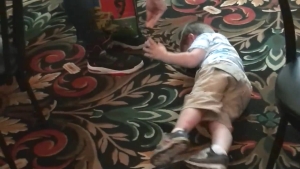
Family talk can create synergy and help everyone become the best they can be.
Family councils are a great way to bring children and parents together in a positive environment where they can discuss and solve problems. The constructive energy generated by these family discussions may not revolutionize the world, but the generation that comes from them just may.
Anger episodes can disrupt a family, increase tension, and reduce the quality of life for the entire family. Most children have temper tantrums between the ages of one and four while they are growing toward a sense of autonomy and self control. If a child continues to act out as they become older, there may be some unmet needs in his or her life.
Wayne, age 6, stormed into the room. "I can't find my new Lego set."
"You took it to your bedroom when we got home," said his mother.
"I can't find it!" Wayne threw himself on the floor and kicked and screamed.
For Adults:
The child's unmet needs
Children act out because of unmet needs. It's important to look beyond the behavior and see what your child's need is:
- Maybe he is tired, hungry, or wants some love and attention.
- Maybe she has been bullied by older siblings.
- Maybe his parents have just divorced and he's angry about it.
- Maybe she always gets her way when she has a temper tantrum.
- Maybe he's the middle child caught between a star older sibling and the darling baby.
The reasons can be endless.
Recognition smile
When your child is calm and happy, talk with him about the causes of his temper tantrums. When you ask him, he'll probably tell you he doesn't know. Make a guess as to what you think the problem is. He'll let you know you're right with a recognition smile.
Think, Feel, Act
Our thinking determines our feelings, and our feelings lead to our behavior. Many educators suggest a time out for the tantruming child. The time out doesn't need to be a punishment for the child. It can be a positive time where the child has a chance to change her thinking and feelings and actions. I know a teacher who calls the "time out" area the "make a better choice" area.
Make a better choice
After your child is calm, talk with her about the situation that caused her to get angry and help her find a way to solve her problem with a better choice when she is angry next time. It will give her a feeling of validation if you listen to her suggestions and give her a chance to set a plan.
Be patient
A child doesn't learn to read the first time he sees the words. He won't learn self control the first time you talk with him, but he will be on the path to self discipline so don't give up if you don't have instant results.
For Kids:
A temper tantrum is an emotional outbreak usually accompanied by screaming, crying, and stubbornness.
Think, Feel, Act
Your thinking makes your feelings, and your feelings make your actions.
Things you can do to keep yourself under control:
- Remember the last few times you had a temper tantrum.
- What upset you each time? Was it the same problem?
- Talk with your parents about the difficulty.
- Come up with several ways you can solve your problem.
- You and your parents can decide together which one of the choices is best.

Activities that help you work through your anger:
-
Physical exercise
- Climb the jungle gym at the park
- Play soccer
- Ride a bike
- Swim
- Punch a pillow or punching bag
- Kick a pile of dirty clothes
- Wash the car
-
Keep a journal
- Write a journal
- Draw in a sketch book
- Scrapbook a journal
- Create a craft
-
Discuss other activities with your parents
- Be creative
- Find what will work for you
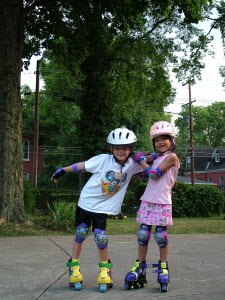
All of us need to learn to control ourselves. Ask other members of your family if they ever had problems with their tempers when they were kids? How they did solve their problems? Have them list the behaviors that worked for them.
You are the best, and you are becoming better every day! So do your best.